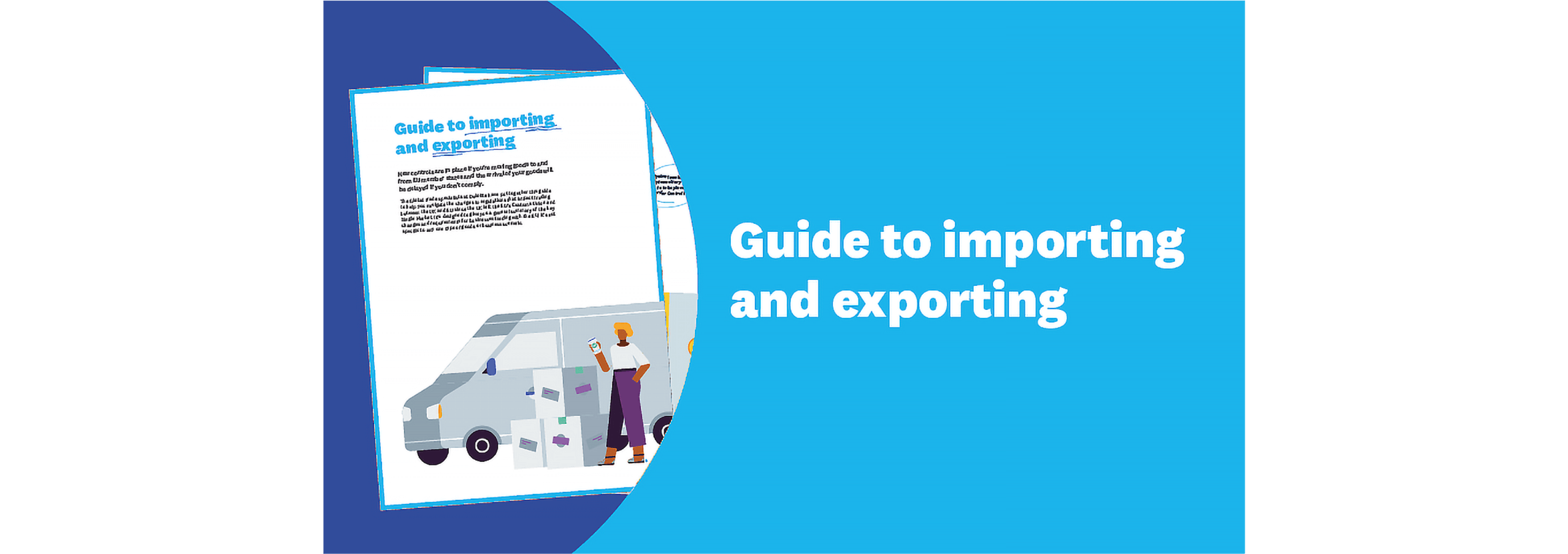Brexit and its impact on small business accounting
We want to help the UK’s small businesses and their advisors make the necessary adjustments to Brexit.

How does Brexit affect businesses?
Below is some advice we’ve shared to help entrepreneurs safeguard their business for what’s ahead. We’ll update this page with more advice on a regular basis, so be sure to check back from time to time.

Guide to importing and exporting: understand the recent changes and how they impact you

The impact of Brexit on small businesses: how to prepare for Brexit

The impact of Brexit on small businesses: where to go for advice

The impact of Brexit on small businesses: keeping on top of cash flow

The impact of Brexit on small businesses: how to get paid on time

The impact of Brexit on small businesses: why you need an accountant

The impact of Brexit on small businesses: what to look out for in the months ahead

Impact of Brexit on profits
Almost one third of small businesses believe Brexit will have a negative impact on profits.

Faster GST recovery
There’s been a faster way to recover VAT on goods imported to the UK from 1 Jan 2021.
Go to Xero Central for further information on preparing for Brexit or to ask us questions and get help.
FAQs
At Xero, we want to make sure that small businesses and their advisors have certainty. Whatever happens, businesses need to know where they stand so they can prepare.
Small business help
What’s changed since 31 December 2020?
This was the date when the transition period with the EU ended. The UK now operates a full external border as a sovereign nation.
If they haven’t already, businesses will need to make a number of changes to ensure the continued flow of people, data, goods and services between the UK and the EU. To give businesses extra time to make necessary arrangements, the UK Government took the decision to introduce the new border controls in three stages until 1 July 2021.
Does this mark the end of negotiations?
Not yet. Decisions are still to be made on areas like data sharing and on financial services over the coming months, and the agreement on fishing only lasts five years.
How does this impact imports?
The UK government now has full border controls on imports coming into the country. Traders importing non-controlled goods, covering everything from clothes to electronics, will need to prepare for basic customs requirements if they haven’t already.
This site on gov.uk walks you through what you need to do when it comes to imports. These include understanding what tariffs apply and whether VAT is due at the border.
How does this impact exports?
You need to make customs declarations when exporting goods to the EU. You can make the declarations yourself, but most businesses use a courier, freight forwarder or customs agent. This site on gov.uk walks you through what you need to do when it comes to exports.
Are there any VAT implications?
Yes, if you are importing goods into the UK from any country (not just the EU), you can use postponed VAT accounting (PVA). This means that UK VAT-registered businesses will account for the import VAT on goods imported into the UK on their VAT returns. They will also need to both pay and recover import VAT on the same VAT return.
You can choose to use PVA if you:
- have a UK business that is registered for VAT
- import business goods to the UK valued at more than £135 (exclusive of VAT)
- select to use PVA on the customs declaration
- use your own VAT registration and EORI numbers on the customs declaration
- using PVA in Xero will be simple
You can check here for more information on whether import VAT will be due at the border.
This might be a good time to ask your accountant for help.
Can I still use UK MOSS (mini-one-stop shop) for reporting sales of my digital services?
You can no longer use the mini-one-stop shop (MOSS) single VAT return to report sales to the EU. You must either register for VAT in each of the EU countries you sell to, or apply in any EU member state for a MOSS registration number. You can use this to report quarterly sales to all the EU countries under the non-union MOSS scheme. Don’t forget to complete this in time for January reporting.
I'm in Northern Ireland. I believe our rules for trading are different?
Yes they are. Due to the Northern Ireland protocol you are still part of the EU customs and VAT regime when trading goods with the EU. Services are excluded from the NI protocol. The UK government will run a new trader support service for moving goods between NI and Great Britain. HMRC's Accounting for VAT on goods moving between GB and NI has more details.
Are there now tariffs and duty to pay on imports from EU countries?
There is some uncertainty associated with changes to tariffs. Check the most up-to-date tariffs on EU databases such as Market Access Database and TARIC. Monitor legislation changes closely and prepare for potential disruption. Again, this is a good time to chat to your accountant. You can check the tariffs that apply to goods on the gov.uk site.
Will there be different employment rules for EU citizens in the UK?
Yes, there is a immigration system as well as new rules about the right to work. Check out employing EU citizens in the UK on gov.uk for guidance.
If you employ EU, EEA and Swiss citizens, you can signpost them to the information they need to have applied to the EU Settlement Scheme, enabling them to secure their future in the UK. The deadline for applying was 30 June 2021. Find out more on the Gov.uk site.
Is business travel in the EU impacted?
The UK and EU agreed that short-term business visitors won’t need to hold work permits or undergo economic needs tests.
People visiting a country to set up businesses will be permitted to remain for as long as 90 days in any six-month period, according to the deal. Alternatively they can travel anywhere in the EU up to a total of 90 days within that six month period.
Do the same GDPR regulations still apply?
Yes, they do. The General Data Protection Regulation, which came into force in May 2018, covers companies that have EU citizens as customers. Therefore, it still applies when the UK is no longer a member of the EU.
How has regulation changed?
Things didn’t change overnight, as the vast majority of existing EU laws and regulations have become UK laws and regulations, under the EU Withdrawal Act. A lot of this will form part of the ongoing negotiations over the next couple of months.
Until then, the longer term future of UK laws and regulation is not clear. But, the Act makes provision to amend, repeal or remove laws as necessary.
What happens to services and professional qualifications?
UK services businesses now need to comply with the regulations in each individual EU country they work in, rather than following one set of rules for the whole of the EU.
In addition, professional qualifications will no longer be automatically recognised so individuals will need to check each country's rules to make sure their qualifications remain valid. The UK and EU will continue to discuss this in an attempt to improve access to the EU for the UK services sector.
Where can I get more help?
The government’s Get Ready for Brexit Checker and The Border Operating Model on gov.uk are good places to start and will offer more specific next steps depending on your business. We recommend signing up for the updates. Enterprise Nation and the Federation for Small Business also have helpful Brexit resources. And keep checking the Xero Brexit hub for further guidance.
Changes to Xero
Is the Xero platform ready for Brexit?
Yes. We took all the necessary steps to ensure we could guide our 600,000+ UK small business subscribers and their advisors through the transition period. Just as we have done with the pandemic, we are ready to keep the Xero platform up to date with necessary changes, and to support British small businesses as they adapt.
Has Brexit changed how I access Xero?
There will be no changes to how you log on to and access Xero. Your experience of using the platform will remain unchanged.
Will my bank feeds still work with Xero after 31 December 2021?
If your business banks with a UK bank, nothing affects your direct bank feeds after this date. There’s also no impact for the rest of Europe as we don't passport into any other European country except for the Republic of Ireland. Other European countries are already manually importing bank statements.
Can I process postponed VAT accounting (PVA) on Xero?
We have developed a PVA update in Xero. It will be released well before you need to deal with your first VAT return in the new year. The new functionality will be automatically available at no extra cost to Xero customers who use Making Tax Digital (MTD) or the new non-MTD VAT. Flat rate and old non-MTD VAT Returns will not have PVA functionality. Read more here.
Now that the UK and EU have reached a deal, what is happening to bank feeds in Ireland?
Our ability to 'passport' our UK regulated status into Ireland is no longer possible. Even though a trade deal has been reached, this does not yet cover financial services. Talks are due to commence in January to address this, but it will likely be a lengthy process. We have been working for the last 12 months to find options to provide automated bank feeds for Irish banks, and we will continue to do so in light of these talks.
As a result we are unable to continue to provide those customers with automated bank feeds. Since 1 January 2021, customers using Irish banks (excluding UK branches) now need to manually import bank transactions into Xero. You can find out how to manually import transactions here.
Start using Xero for free
Access Xero features for 30 days, then decide which plan best suits your business.